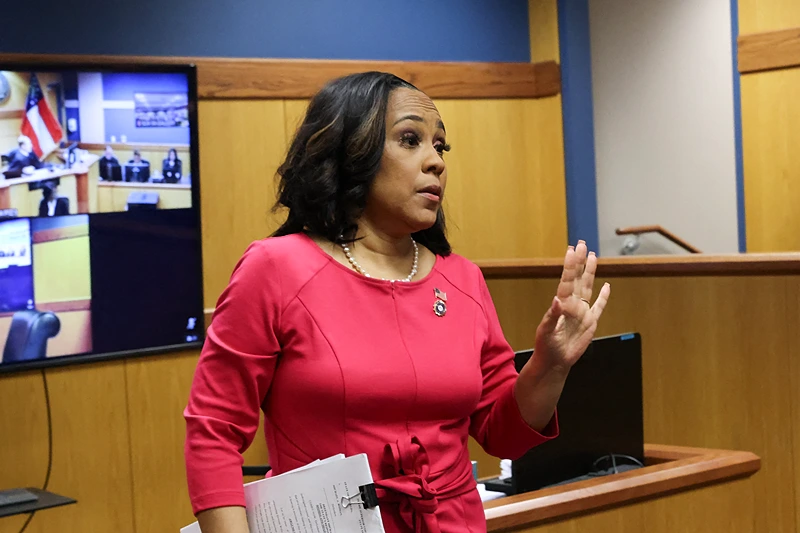OAN Staff Brooke Mallory
6:40 PM – Thursday, January 9, 2025
After she repeatedly broke the Peach State’s open records laws, Fulton County District Attorney Fani Willis is now being reprimanded by a Georgia court, which is ordering her to pay a hefty fine.
Advertisement
In response to an open records request, the prosecutor’s office denied having any documents demonstrating any correspondence with special counsel Jack Smith or members of the now-defunct House select committee looking into the January 6th protest at the U.S. Capitol, outlet Law&Crime previously reported.
Fulton County Superior Court Judge Robert McBurney ordered the district attorney’s office to provide the requested documents and/or provide an explanation for their continued absence late last year in response to a lawsuit filed by conservative government watchdog group Judicial Watch. McBurney also left open the possibility of attorneys fees.
According to the court’s most recent judgment, dated January 3rd, but made public just this week, the judge awarded the plaintiffs $21,578 in attorneys’ fees and costs after hearing arguments from Willis and her staff.
“Fani Willis flouted the law, and the court is right to slam her and require, at a minimum, the payment of nearly $22,000 to Judicial Watch,” Judicial Watch President Tom Fitton said in a press release. “But in the end, Judicial Watch wants the full truth on what she was hiding — her office’s political collusion with the Pelosi January 6 committee to ‘get Trump.’”
Judicial Watch stated in the underlying lawsuit that Willis had made “likely false” statements regarding the retention of the disputed papers.
Overall, the court sided with the plaintiffs, concluding that Willis had broken the law on the merits of repeatedly lying about the existence of at least part of the requested papers and had procedurally lost the case by refusing to respond.
The court’s order is deteriorating in its appraisal of Georgia’s Open Records Act (ORA) violations committed by Willis and her subordinates.
“Most basically, by operation of law Defendant acknowledged violating the ORA when she defaulted,” McBurney writes. “But actual evidence proves the same: per her Records Custodian’s own admission, the District Attorney’s Office flatly ignored Plaintiff’s original ORA request, conducting no search and simply (and falsely) informing the County’s Open Records Custodian that no responsive records existed.”
Willis has now recently acknowledged that there are, in fact, documents that are responsive to the January 6th committee. However, her office also still claims that there was never any correspondence with the office of the special counsel. Willis initially argued that no such records could be located for at least a year.
“We know now that that is simply incorrect: once pressed by a Court order, Defendant managed to identify responsive records, but has categorized them as exempt.” McBurney stated. “Even if the records prove to be just that — exempt from disclosure for sound public policy reasons — this late revelation is a patent violation of the ORA. And for none of this is there any justification, substantial or otherwise: no one searched until prodded by civil litigation.”
In reality, the court notes that Willis’ office did have at least one non-exempt response document. It was a letter that was written to the head of the committee on January 6th. Notably, this letter was the subject of the lawsuit filed by Judicial Watch, the conservative watchdog that obtained the document after Willis denied that it ever existed.
Willis eventually supplied the letter straight after defaulting, enclosing it in a note that she submitted in response to a court order demanding her to do so.
This change of events was glaringly recalled by the judge:
“In this memo, Defendant announced that there still were no records responsive to one set of Plaintiff’s requests (communications with former Special Counsel Jack Smith) but that there were in fact records responsive to Plaintiff’s second set of requests (communications with the United States House January 6th Committee) — but those were exempt from disclosure. Defendant, despite these reservations, did gamely attach to her memo a copy of the letter she wrote to the Chairman of the House Committee that (1) does not appear to be covered by any of the exemptions identified in the memo and (2) had already been identified by Plaintiff as a responsive record that was wrongly withheld.”
“Somehow something had changed,” the judge continued. “Despite having previously informed Plaintiff four separate times that her team had carefully searched but found no responsive records, now there suddenly were — but they were not subject to disclosure under the ORA.”
The district attorney’s office made some important disclosures regarding the events that led up to this.
“Plaintiff’s deposition of Defendant’s Records Custodian shed some light on this mystery: he admitted that there was no search for records back in August 2023,” the court order goes on. “Just a ‘no, go away.’ He further clarified that, when Plaintiff did not go away but instead sued, there still was no organized, comprehensive examination of the District Attorney’s Office’s records.”
McBurney continued to condemn the DA’s office for their efforts to adhere to the law in a footnote.
“Even after litigation began, Defendant’s Records Custodian initially merely asked certain employees if they thought they had any responsive records; there was no rigorous review of e-mails or case files.”
Willis was in default last April after the case was filed in March 2024. Since then, the legal proceedings have proceeded slowly. In December, the formal default verdict was entered.
Judicial Watch filed a supplemental application requesting that the court designate a special master to search the agency’s files for the documents after the prosecutor was found to be in default.
Willis can reply to the motion until January 16th. The money owed by her office is due on January 17th.
“The ORA is not hortatory; it is mandatory,” McBurney concluded. “Non-compliance has consequences. One of them can be liability for the requesting party’s attorney’s fees and costs of litigation.”
Stay informed! Receive breaking news blasts directly to your inbox for free. Subscribe here. https://www.oann.com/alerts
Advertisements below











